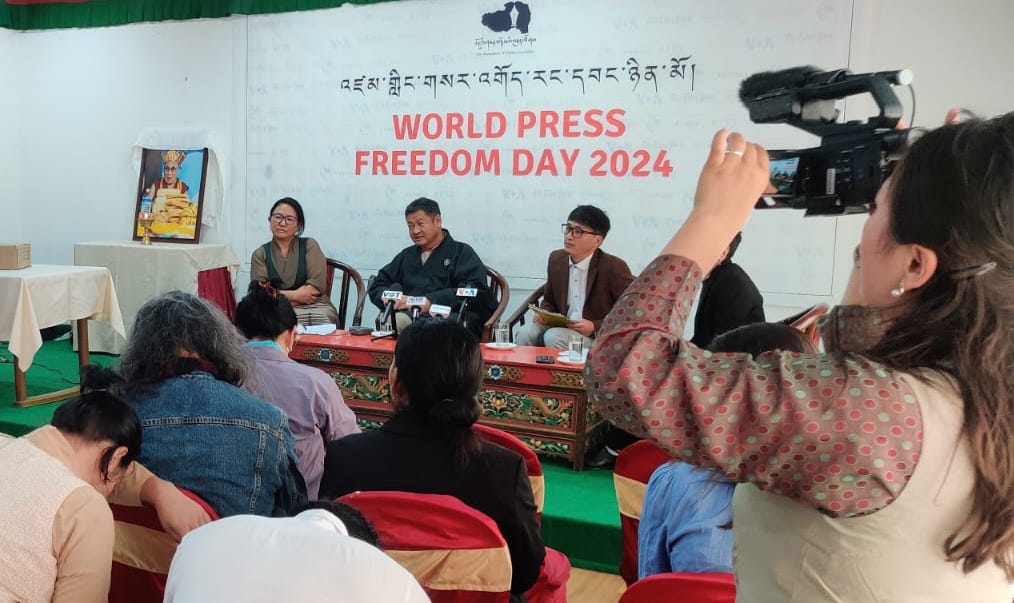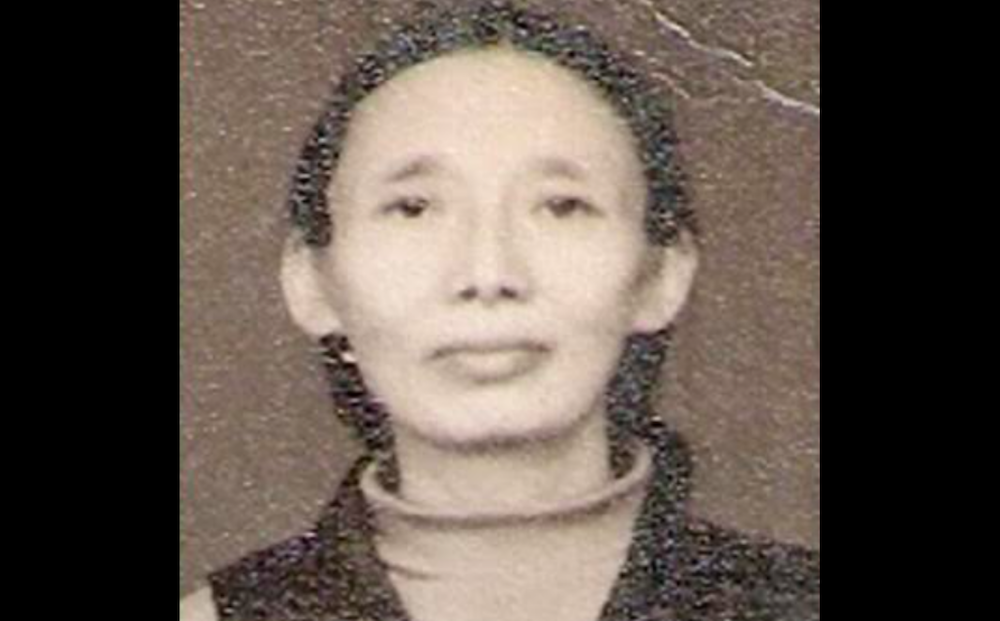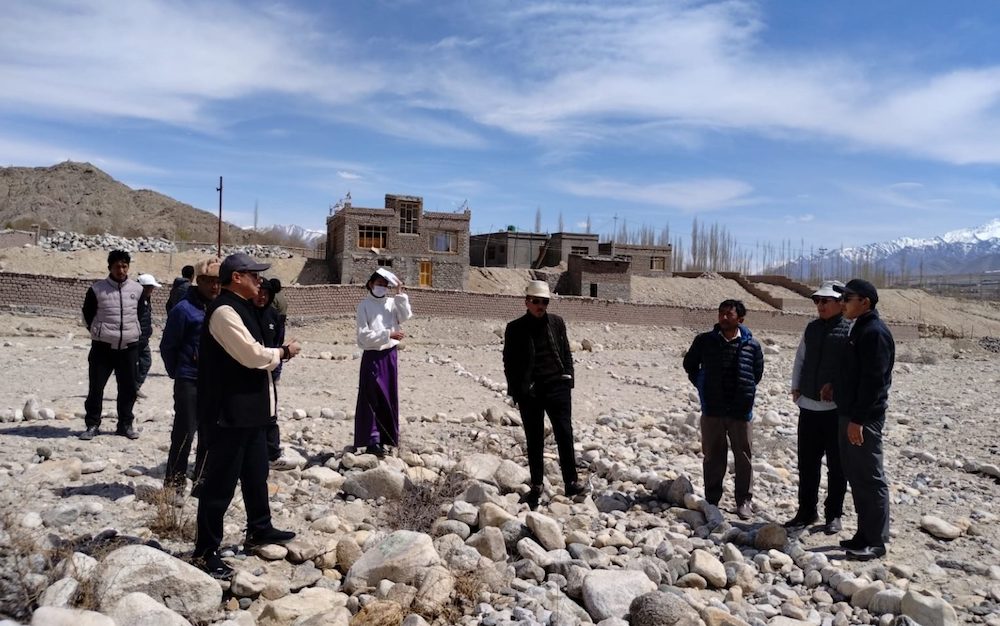 By Topden Tsering
By Topden Tsering
July 24 – Michael Peranti’s book reading in San Francisco this evening on his latest, “The Assasination of Julius Ceaser”, was a delectable fare. The fifty something-strong audience sat riveted through his hour-long discourse on the explosive days of ancient Rome – a seductive backdrop in empires and corruption, slumlords and urban rioters, death squads and political witchhunts – which set the stage for Ceasar’s proverbial death at the hands of Brutus. As he put it, jokingly: “This book has lot of sex and violence in it.”
But my place in that hall of literary eloquence was not one as a nibble-by-the-crumb seeker in the art of writing. The politics of my being had marked by space. And so I had on a Rangzen T-shirt and at regular intervals, I interchanged between the two placards that I shoved up into the air, both cardboards scribbled with black and red markers: “Michael Peranti: Apologist No. 1 for China’s Evil Regime in Tibet”. “Michael Peranti’s article on Tibet: A Classic in Gross Sensationalism, Historical Incompetence and Moral Corruption.”
Five Tibetan women, hurriedly called into action by Dolma Chetung la, and one other Tibetan man counted down their final moments for protest.
Halfway through his talk, after several glances over his glasses at my placards, it seemed the tension of our positions had injected into the color of his face, the plum redness of my marker. The narrative assumed a somewhat disrupted pattern, his speech coming out in stuttering bouts of rhetorics, most of which now focused on class exploitation, as if indirectly he was readying to defend his work of slanderous indictment on Tibet’s past systems, the article: “Friendly Feudalism: The Tibet Myth”.
But by the end of his talk, Peranti virtually relived the anti-climax of his book’s subject when he excused himself from the customary question-and-answer session on account of some sore throat. But not before he had ended his presentation on a politically correct note: “We must keep up our struggle for a better world.”
Tearing my way through the jostling crowd, I stopped short in front of his brisk moustache and challenged: “That was indeed a very uplifting note on which to end your talk, the struggle for a better world and all that, but do you realize that for the Tibetans, the struggle is for their very survival, and that your book, steeped as it is in historical inaccuracy and a total lack of literary integrity only serve to endorse China’s genocide of the Tibetan people, under your mutually-inspired vernacular of “Liberation”? (Well, not in these exact words, of course, but something close…)
“Who are you?”, he barked at me. “I’m sure you’re one of those Tibetans whose interests are offended by my findings.” “Well then, let’s square it off on the mike,” I said. “For someone who can’t tell China from the Mongols; a Chinese warlord, Ma Bufeng, from Koumintang Chiang Kaishek; the fifth Dalai Lama from the second, I’m not surprised you have to resort to “sex and violence” to promote your authorships.” “I said I’m not talking to you!,” he maintained.
Before I knew it, three men, perhaps his henchmen, were hurling the most colorful abuses at me, the F-word and what not. One of them shouted, “Get Out”, in such ear-splitting intonation and at such precise intervals, that I felt each and every syllable of my protestations drowning into an acute void. But by now, my Tibetan fellow-protestors had joined me in stacking up against their hypocrisy and lies, the sheer magnitude of truth that was our message. A couple of other people spoke up for us, asking for our “right to express” be respected.
Before long we were all outside the bookstore. And all we could do was wait for him to come out and, if we were lucky, to talk to us. (As suggested by some friends, I was thinking of inviting him to sit with Tibetans and try get to know the situation first-hand, perhaps invite him to dinner or something, despite my conviction that his journalistic disservice to Tibet and Tibetans was purely intentional and profit-motivated) But when he did walk out of the store, and into the next-door restaurant for dinner, he conveniently bypassed both us and our placards, with an aplomb reminiscent of Hu Jintao.
Waiting outside the restaurant, the placards in my hands, three children walked out with their mothers. They started asking me questions about my placards. I tried explaining the best I could, in the language they’d understand, although I think I must have done a terrible job at it. “Which one of them is he?” asked one of the two little girls. I pointed Michael, from amongst his gang who were all seated close by the door, out to her and her friends. “So he’s saying China is right in killing the Tibetans?” she asked. “Not exactly, but…..,” I continued, this time trying to simplify the complexity of the matter for their easy comprehension.
“And are you asking for money?” the little boy asked me, mistaking my placards for homeless people’s familiar entreaty. “No, I am not, but perhaps he’s getting some good money from the Chinese,” I told them. And they went: “Hmmmm!”
Acknowledgement:
Thanks to SFT folks for giving me the heads up on the event. Also to Dolma la, Thelpo la and other Tibetans for showing up.









